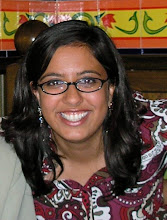Journalists hoping to walk away from the first annual
NewsVision conference March 30 with clarity on the industry’s turmoil probably needed a stiff drink at the post-conference happy hour at the Capital Grille.
Held at Washington D.C.’s Newseum, the conference, titled Journalism Jobs in Transition, unearthed fascinating paradoxes within the changing media landscape. Organized by the Philip Merrill College of Journalism in partnership with the Online News Association, sponsors included The Newspaper Guild and the Knight Center for Specialized Journalism.
The next few years will probably get even tougher, speakers warned, but the fundamentals of good storytelling will come out stronger.
“I’m optimistic about the future too, but I’m scared to death about how we’re going to get there,” said Lou Ferrara, a managing editor at the Associated Press. “It’s not as simple as creating a Web page anymore.”
But the media world revolves around the Web. In a survey released
today, 39 percent of online journalists reported increases in their newsrooms over the past year. The survey, conducted by the Pew Research Center’s Project for Excellence in Journalism, also found an “uneasy optimism” among online journalists. While 82 percent are at least somewhat confident that the industry can find a profitable business model online, 57 percent said the Internet is changing journalism values and 54 percent think journalism is headed on the wrong track.
This may be because the media as we have known it, where editors handpick information and package it in a newspaper or broadcast, is disappearing, maybe for good.
Since the concept of packaging has changed, journalists should stop distinguishing between platforms, Ferrara said. Washingtonpost.com Managing Editor Ju-Don Marshall Roberts added that the rapid pace of technological development means that any business model must have flexibility built in.
But as journalism undergoes massive transitions and the global economy suffers through the recession, that business model will likely take a few years to emerge. We’ve raced from a world where readers explored content in a newspaper to one where users exploit search engines and social media for information, said Eduardo Hauser, CEO of
DailyMe, Inc., a personalized content aggregator. We can’t handle either and are trying to reconcile the two extremes, he added.
While the Internet has dramatically reduced start-up costs for independent ventures, the PEJ study found that 71 percent of online journalists work for legacy Web sites and 63 percent say original reporting is their most important content. Least important to these journalists is user-generated content.
And yet, the Internet’s potential for interactivity is what makes it so powerful. In connecting people, the Web has given users control over what they consume. Social networking gives the media a chance to harness that energy and improve their own content. Tools like Twitter are no different than real-life networks, said Orlando Sentinel
technology columnist Etan Horowitz.
Instead of posting a generic call for story ideas, “think about how you’d talk to someone at a cocktail party or a networking event,” Horowitz said. Enter with low expectations since “you don’t know what you’ll get.”
Scott Karp, CEO of Publish2, a content-sharing site, emphasized collaboration within and between newsrooms. USA TODAY’s Patrick Cooper discussed reporters as curators of a specific subject, telling stories and becoming a go-to source for readers much like Gene Sloan and his
Cruise Log blog.
Journalists must also rethink the fundamentals of storytelling. For decades, media has focused on text while using video “for eye candy, not for context,” said Tom Kennedy, former multimedia managing editor at washingtonpost.com. Journalists now have a repertoire of tools – text, photos, audio, video, podcasts. The key is determining which tools go with which stories.
The industry’s flux makes it the perfect time to be creative in storytelling. “If you’re not making a certain number of mistakes, you’re not experimenting,” PBS Senior Vice President Jason Seiken half-jokingly said.
Washingtonpost.com’s Marshall Roberts said that, for the first time, her newsroom feels like a start-up. “The scary part about that is it’s like driving down the highway with the lights turned off,” she said. “We have to embrace the chance that we could fail.”
But failure is a scary prospect for those who rely on journalism to pay the bills. Yet another paradox arose as panelists discussed how journalists can remain competitive during turbulent times.
Politico co-founder and Editor in Chief John Harris likened today’s reporters to athletes, each with his or her own talent to hone. The deluge of content has reduced the importance of brand names and the wave of entrepreneurialism means reporters can use their talents and create niche content.
While Harris emphasized mastering one skill, other speakers reiterated the need to be proficient in all areas of storytelling. The conference’s keynote speaker, NPR President and CEO Vivian Schiller mentioned that the organization is spending $2.5 million ($1.5 million of which came from the John S. and James L. Knight Foundation) to teach its entire staff digital storytelling skills.
Fundamental changes in the distribution and consumption of news have left journalists uneasy and put American democracy at risk. But we have the unique opportunity to not only witness history, but shape the future of the media industry, Schiller said. For someone eight weeks away from graduation, that was reassuring and inspiring.




